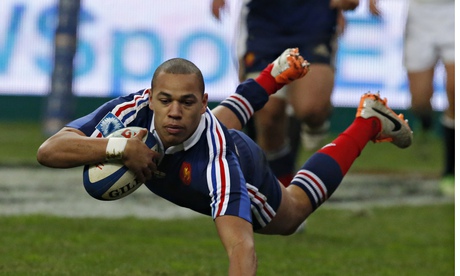
Even in the period when France scored their first 16 points, there was something downright odd about their play. Of course, it didn't matter a jot. Not to the French audience, anyway. They were hardly going to apologise for bounces that went Yoann Huget's way. They weren't going to say sorry to Jack Nowell for the knock-on from the kick-off, the ball coming to the young wing over the heads and arms of forwards who really should have swallowed it. The ball went loose and Huget scored with the hands of the clock barely in motion. Thirty-two seconds.
The passage of time was important, because by the end each second counted. But, to repeat the point, there was something odd about the French performance even when they were building their lead. The tries came from bounces that followed kicks, one by Jules Plisson that touched Billy Twelvetrees before sitting up for Huget, rather than for Mike Brown. The England full-back was left on heels of lead in the Harlequins-Clermont game, and here he was again, stranded by the bounce and squarely flummoxed.
The other kick that bounced kindly for Huget was by Brice Dulin, a more controlled dink into space. If anybody was going to issue an apology out there, it might have been the Castres counterattacker, who looked reluctant to put his boot to the ball. He obviously wanted to run. But he did kick and Huget did score.
England then made all the running. And France stopped kicking because they had very little to pass or kick with. They stretched their lead to 16-3 but by the end of the first quarter, England were firmly back in the driving seat.
There was athleticism in the front five, with Courtney Lawes and Joe Launchbury supplementing the back row in open play. Lawes made some thunderous tackles. If there was a downside to the general sense of control in England's response to finding themselves trailing, it was the scrummage, where France had a slight edge.
But England were composed and forceful at the breakdown and in Danny Care they had a livewire, mixing up the options and putting speed on his team's rhythm. England looked comfortable as they scored 21 unanswered points. It was as thorough as the All Blacks' comeback against Ireland in November. Not quite as melodramatic, because the margin was smaller and the timescale bigger.
England recovered from the shock of seeing the rugby ball bounce badly for them and played as well as they have done under Stuart Lancaster. Billy Vunipola mixed passes with charges and Brown, now on the wing for the unfortunate Jonny May, finally scored a try for his country in his 22nd game. If ever there was a sign that the flow of luck had been reversed this was it.
Luther Burrell scored on his first outing, which may have struck Brown as bloody typical, but of course he wouldn't have said as much, because the collective spirit was so evidently positive and the workload so evenly shared. Everything was going swimmingly well.
And then it all went horribly wrong. France had not been able to continue with their kicking game because they had no ball. And their passing game had led to nothing. Mathieu Bastareaud was well contained and Louis Picamoles halted in his tracks. The French did not pass the ball because Bastareaud and Wesley Fofana do not have it in their set of skills to do so. They run but do not pass.
Without a kicking game or a passing game, France simply replaced one set of giants with another. On came the six forwards from their bench. They changed their scrum-half and that left them with just one bloke left, the 19-year old Gaël Fickou, anything but a Bastareaud.
Almost as an afterthought the youngster was sent on. And certainly out of desperation, France decided to pass the ball. Through the hands it went, back and forth and the weirdest thing happened. Space appeared. It required Dimitri Szarzewski to take a fast pass at knee level, recover his balance and remember how to ship it on, but the replacement hooker dug deep into his memory banks and gave the pass.
To Fickou, who scored. He sold a dummy, which remains a bit of a rarity in the modern game. Or rather, the rarity was that it was bought. Perhaps Alex Goode thought the inside channel would be covered.
It's what the passing game can do: befuddle the minds of players who are accustomed by the 76th minute to the pace of a game they control. Having tightened their grip on France throughout the second half, why should England suddenly lose their bearings? It's what a passing game can do, especially when executed by the French, who run angles and lines from deep like no other country on earth.
Somehow these instincts survived the imposition of grind and boot. The kicking game had weirdly worked for France, but the game was snatched from the English by something gloriously mercurial, the flow of a runner from deep, taking a sweetly timed pass and finishing with a glide to the posts.
It was a moment of Frenchness at the end of a game dominated by Englishness. It was a glimpse of … please let it be the future. More Fickou and less reliance on the weird bounce of a kicked rugby ball.

